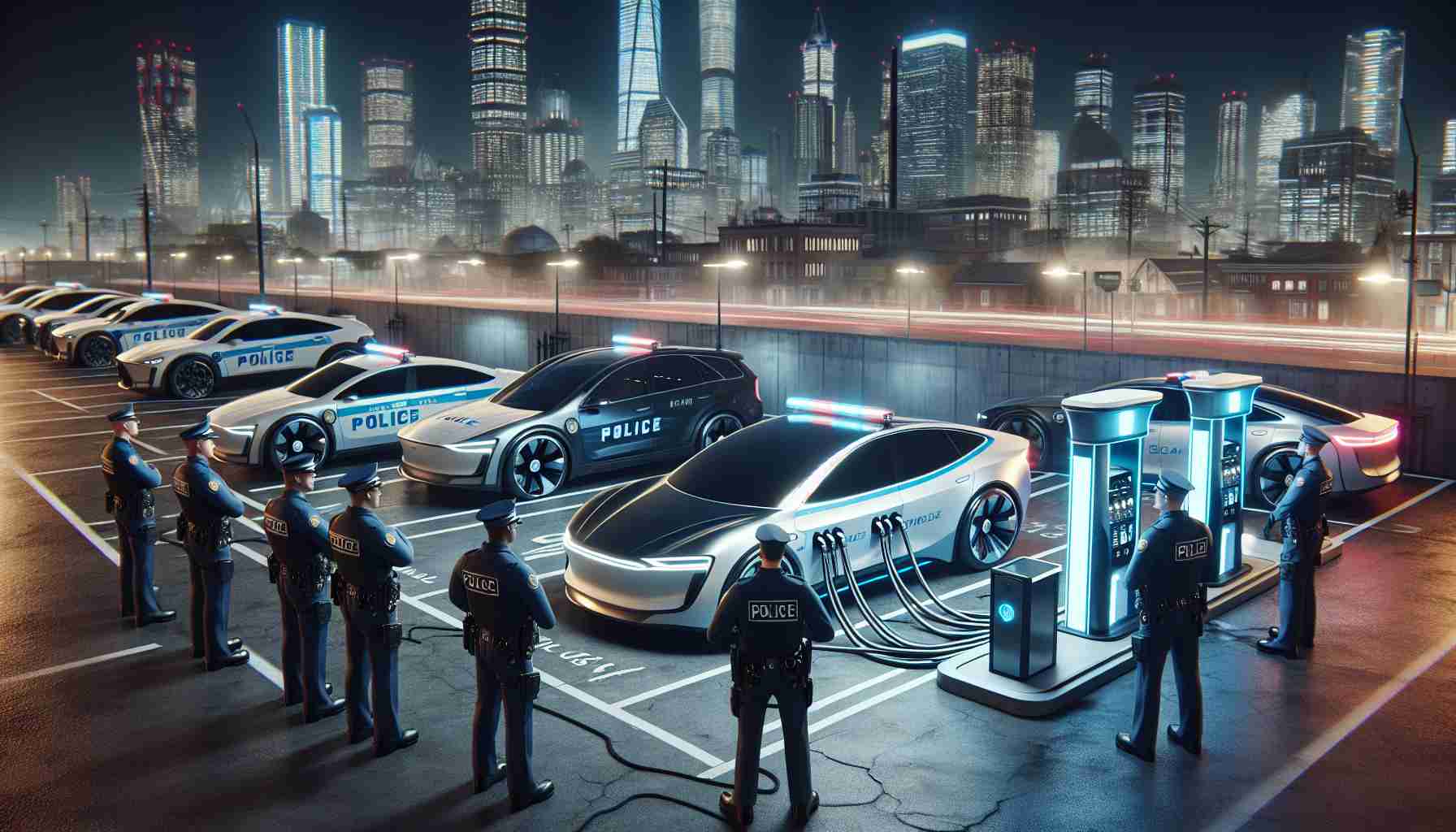Michigan State Police Embrace Electric Innovation
The Michigan State Police are making a significant leap towards sustainable law enforcement. Starting this Monday, they are introducing their inaugural battery electric vehicle (BEV) into active patrol duties. The choice is the impressive 2024 Ford Mustang Mach-E, designated for the State Security Operations Section in Lansing.
This vehicle will be operated by state properties security officers, who are fully armed and uniformed. Their role is to ensure safety and security at various state-owned and leased locations in the area. The director of the Michigan State Police, Colonel James F. Grady II, expressed optimism about this development, believing it offers a unique chance to evaluate the performance of a police-ready electric vehicle in real-time.
Patrolling city limits at lower speeds, these security officers typically cover fewer miles each day, making Lansing the perfect testing ground for this innovative vehicle. With accessible charging facilities in the downtown area, the conditions are ripe for this pilot program.
The state’s Precision Driving Unit, known for its thorough evaluations of police vehicles, has previously assessed hybrid models, but this marks a new chapter. Lieutenant Nicholas Darlington pointed out that incorporating the BEV into their fleet allows for a comprehensive long-term performance study, aiming to uncover potential cost efficiencies and future applications for electric vehicles in policing.
This initiative reflects a growing trend towards greener practices within law enforcement and could pave the way for a more sustainable future on the streets.
Michigan State Police Embrace Electric Innovation
The Michigan State Police are making a significant leap towards sustainable law enforcement with the introduction of their first battery electric vehicle (BEV) into active patrol duties. This is a notable transition into an era of environmentally-conscious practices within the realm of policing, primarily exemplified by the deployment of the 2024 Ford Mustang Mach-E. This vehicle will serve in the State Security Operations Section in Lansing, marking a pivotal moment in the evolution of law enforcement.
The environmental impact of this initiative is profound. Traditional gasoline-powered vehicles contribute significantly to greenhouse gas emissions, which are a major driver of climate change. By transitioning to electric vehicles for law enforcement, the Michigan State Police not only reduce their carbon footprint but also set a precedent for other state agencies. Electric vehicles (EVs) emit zero tailpipe emissions, promoting cleaner air and aiding efforts to combat air pollution—a crucial issue that affects public health and ecological balance.
Moreover, the incorporation of electric vehicles into law enforcement operations relates directly to the broader social implications for humanity. As more states and cities adopt sustainable practices, the collective effort can lead to significant improvements in urban air quality, which has been linked to respiratory issues and other health problems. This drive towards sustainability is not just about protecting the environment; it also has substantial human health benefits that resonate throughout communities.
From an economic perspective, electric vehicles can offer long-term cost efficiencies. Although the initial investment in purchasing BEVs may be higher than traditional vehicles, the lower operational costs—such as reduced fuel expenses and maintenance—can lead to substantial savings over time. As the Michigan State Police evaluate the performance of the Mustang Mach-E, their findings could influence future funding allocations and budget planning for law enforcement nationwide. If successful, this pilot program could inspire other governmental bodies to invest in electric fleets, stimulating economic growth within the clean energy sector and the automotive industry specializing in electric vehicle production.
Looking towards the future, the actions of the Michigan State Police could be a harbinger of a larger shift in societal norms and responsibilities. Sustainable practices, especially within government operations, may encourage a ripple effect; as citizens observe their law enforcement agencies leading by example, they may be motivated to adopt similar practices in their daily lives, from using public transport to choosing electric over gasoline vehicles.
In conclusion, the Michigan State Police’s foray into electric vehicle technology encapsulates a critical intersection of environmental stewardship, public health, economic viability, and progressive social change. This initiative not only enhances the sustainability of policing practices today but also lays the groundwork for a healthier, more sustainable future for humanity. Embracing green technology in law enforcement reflects a broader commitment to responsible governance and innovative solutions to the pressing challenges of our time.
Revolutionizing Law Enforcement: Michigan State Police Introduce Electric Patrol Vehicles
Michigan State Police Embrace Electric Innovation
The Michigan State Police (MSP) are setting a new standard in sustainable law enforcement by integrating electric vehicles into their patrols. Starting this week, they have deployed their first battery electric vehicle (BEV), specifically the 2024 Ford Mustang Mach-E, for active duty. This initiative is part of the State Security Operations Section located in Lansing, showcasing a commitment to eco-friendly practices.
Features of the 2024 Ford Mustang Mach-E
The choice of the Ford Mustang Mach-E brings several advantages to law enforcement, including:
– Performance: Known for its powerful electric drive, the Mustang Mach-E delivers quick acceleration and agile handling, crucial for emergency responses.
– Technology: Equipped with advanced safety features and real-time connectivity, the vehicle enhances both officer safety and community engagement.
– Sustainability: Using an all-electric platform, the Mach-E significantly reduces greenhouse gas emissions compared to traditional patrol vehicles.
Use Cases for Electric Vehicles in Law Enforcement
– Urban Patrols: The Mach-E is particularly suited for urban environments like Lansing, where officers can manage lower-speed patrols, optimizing battery usage and reducing noise pollution.
– Community Relations: Utilizing a BEV may improve community perception, showcasing law enforcement’s commitment to sustainability.
– Cost Efficiency Studies: This operation allows MSP to explore long-term cost savings in vehicle maintenance, fuel, and potentially lower operational costs.
Pros and Cons of Electric Patrol Vehicles
Pros:
– Reduced carbon footprint
– Lower operating costs over time
– Quieter operations, allowing for discreet policing
– Advanced technology for safety and efficiency
Cons:
– Limited driving range compared to traditional vehicles
– Dependency on charging infrastructure
– Initial purchase costs may be higher
Innovations and Insights
The pilot program represents a broader trend among law enforcement agencies nationwide to adopt electric vehicles. As the Michigan State Police’s Precision Driving Unit evaluates the performance of this BEV, they will gather crucial data that may inform future vehicle acquisitions and operational strategies.
Market Analysis: With rising fuel costs and increasing focus on sustainability, electric vehicles are becoming a viable option for police fleets nationwide. Analysts predict this trend will accelerate as technology improves and the infrastructure for charging expands.
Upcoming Trends in Electric Law Enforcement Vehicles
– Increased Adoption: More law enforcement agencies are expected to follow in MSP’s footsteps, testing BEVs in their fleets.
– Technological Advancements: Future electric vehicles may feature improved battery life, faster charging capabilities, and advanced autonomous features.
– Integration of Renewable Energy: Some departments may start using solar or wind energy to power charging stations, further enhancing their sustainability efforts.
In conclusion, the Michigan State Police’s introduction of the Ford Mustang Mach-E as a patrol vehicle marks a significant step towards environmentally-conscious policing. The outcomes of this pilot program could influence the future direction of law enforcement transportation, highlighting the potential for innovation in public service sectors. For more information about innovations in law enforcement practices, visit Michigan.gov.













